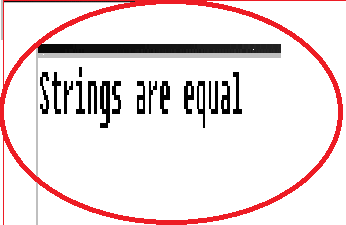Handling of Charactor Strings
A string is an array of characters. Any group of characters (except double quote sign) defined between double quotation marks is a constant string.
"He is good";
If you want to include a double quote in the string we may use it with a back slash.
printf ("\" he is good \" ");
Out put is:
he is good"
operations performed on character strings are-
- Reading and writing strings.
- Combining strings together.
- Copying one string to another.
- Comparing strings for equality.
- Extracting a portion of a string.
Therefore, the size should be equal to the maximum number of characters in the string +1.
This extra location is to store the null character '\0'. Character arrays may be initialized when they are declared.
Example:
or
char name[25] = 'R', 'A', 'M', 'E', 'S', 'H', '\0'}
or
char name[ ] = "RAMESH";
Different String Handing Functions:
C library provides string handling functions and few of which are listed below:
(1) strcat ( )
This function concatenates two strings. The process of combining two strings together is called concatenation.
Syntax:
Example:
char string2[10] = " smart too";
Example 1:
As shown in example1 string1 and string2 are character arrays, when the function strcat( ) is executed, string2 is appended to string1.
It does so by removing the null character at the end of string1 and placing string2 from there.
The string at string2 remains unchanged.
Thus now string1 will have he is good smart too.
Example 2:
The function strcat( ) can also append a string constant to a string variable as shown in example2.
Note:
It is also possible to nest strcat( ) functions.
Example:
char string1[ ] = "he is"
char string2[ ] = "good"
char string3[ ] = "smart too"
All the three strings string1, string2 and string3 are combined together to form a resultant string stored in string1.
(2) strcmp( )
If they are not equal it returns the numeric difference between the first non-matching characters in the string
. Syntax:
string1 and string2 may be string variables or string constants.
Example:
#include
void main()
{
char string1[ ] = "Mahatma";
char string2[ ] = "Mahatma";
int n;
n = strcmp (string1, string2);
if (n == 0)
{
printf("Strings are equal");
}
else
{
printf ("Strings are not equal");
}
}
Output

In the above example the string constant END is compared with the contents of character array variable string1.
If variable string1 contains the string END then the strcmp() function returns zero else it returns a nonzero.
(3) strcpy ( )
The source string is assigned i.e. copied on to the destination character array.
Syntax :
Example:
char string2[ ] = "hello";
strcpy(string1, string2);
In the above example after the execution of the statement strcpy(string1, string2); the character array variable string1 will contain hello overwriting earlier value of He is good.
strcpy (string1 , "hai");
In the above example the string hai is assigned to string1 overwriting the earlier value present in string1.
In both the cases, the size of the array string1 should be large enough to receive the contents of string variable string2 or the string constant.
(4) strlen( )
Syntax:
Where n is an integer variable and string1 is an array of characters.
Example:
#include<conio.h>
void main()
{
char string1[ ] = "He is good";
int length;
length = strlen(string1);
printf("Length of the string is %d\n",length);
}
The argument can be a string variable or a string constant. The counting ends at the occurrence of the first null character.
Similarly you can have string constant as argument for the function strlen() as shown below.
length = strlen ("he is good");
Note:
Arrays << Previous
Next >>Searching & Sorting
Our aim is to provide information to the knowledge seekers.
Support us generously

.jpg)

.jpg)




